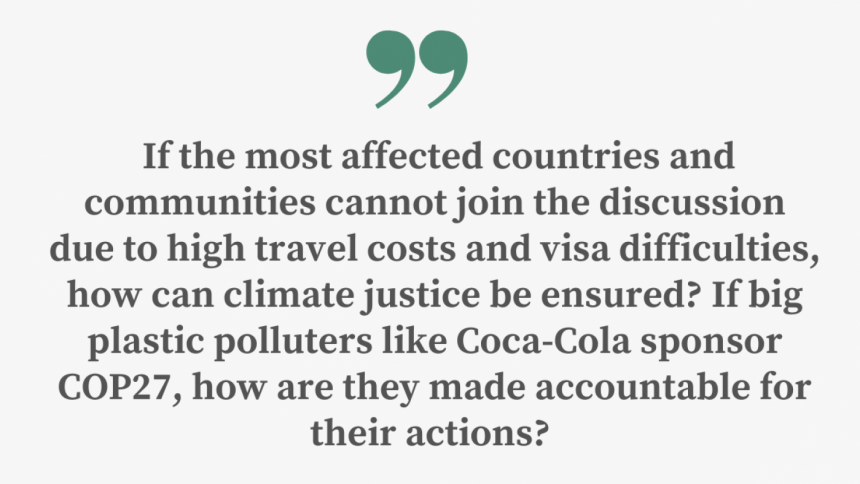November 10, 2022
DHAKA – As global leaders were preparing to attend the 27th United Nations Climate Change Conference (COP27), which kicked off on November 6 in Egypt, 35 people died due to the impact of Cyclone Sitrang that hit Bangladesh on October 24. Between May 17 and August 3 this year, 137 people died in floods across the country. In Cyclone Sitrang, a total of 10,200 hectares of cropland worth some Tk 347 crore (over USD 34 million) were damaged in 31 districts, according to Department of Agricultural Extension (DAE) officials. The latest report of the World Bank said Bangladesh incurs a loss of USD 1 billion every year due to cyclones only.
We have seen many manifestations of climate change particularly this year, with a spate of unprecedented extreme weather events. In India, heatwaves broke records for being the worst in 122 years, Pakistan faced an unprecedented flood, Bangladesh dealt with flash floods twice and Cyclone Sitrang in a span of few months, and many parts of the world suffered from drought. If we analyse these incidents critically, we understand the obvious – we are on a dangerous track to facing the severe consequences of a destabilised climate.
The Intergovernmental Panel on Climate Change (IPCC) recently reported that the global mean temperature has increased by over one degree Celsius since 1850-1900 because of greenhouse gas emissions from human activities. All these casualties and impacts are not standalone events; they are the impacts of a rapidly changing climate.
According to the long-term climate-risk index, Bangladesh is in the seventh position among the most affected countries from 2010 to 2019. A closer look reveals that the global climate is drastically intensifying rains and floods, permanently altering the landscape and putting the nation in a climate flux. Around 850,000 households and 250,000 hectares of harvestable land were lost in climate-induced disasters – cyclones, floods, riverbank erosion, and salinity intrusion that also altered fish species composition – increasing the price of rice by 30 percent between 2014 and 2021, according to the latest IPCC report. On the other hand, the World Bank estimates that the GDP in the agriculture sector may reduce by nine percent, while nearly 13 million people will be displaced by 2050 due to climate change. Their calculations suggest that Bangladesh will require USD 12.5 billion per year to tackle the climate crisis.

These effects represent only one aspect; we know there are many more short- and-long-term impacts. Bangladesh is seeing social impacts like child marriage, school dropout, displacement, loss of crops, etc. Besides, climate change is causing new poverty while escalating the existing poverty.
The irony is that we did not create this problem. Bangladesh is producing a mere 0.5 percent of global CO2 emissions – several notches below China with 27.8 percent, the US with 12.7 percent, and Japan with 2.6 percent (as per the 2018 UN Environment Programme report). It is evident that Bangladesh is paying the price for the development models and energy consumption of wealthy nations.
It is therefore crucial to raise the issue of loss and damage finance, a fundamental part of climate justice, in the ongoing COP27. The question, however, is if it will be addressed this year, as this is not the first time the need for loss and damage finance and compensation has been emphasised. At COP26, the demand for a loss and damage finance facility to support technical and financial mechanisms was made and instantly rejected. All countries agreed to submit their national plans with stronger commitments, including effective measures to reduce emissions. The latest UN report indicates only 23 out of 193 countries have submitted their plans. Even after 31 years of advocacy, lobbying and dialogues, no dedicated finance has been delivered under the UNFCCC to help people deal with the aftermath of climate impacts.
We need to amplify our demands with concerted efforts. Loss and damage finance is immediately needed for countries at risk, like Bangladesh, because it is different from mitigation and adaptation finance, which are for minimising and averting loss and damage. Consequences of human-induced climate change that can neither be averted nor avoided require immediate assistance, rather than waiting for humanitarian aid or loans that will drive the affected countries into debt.
The participating countries and COP27 organisers also need to look into how to make these conferences accessible for developing countries. If the most affected countries and communities cannot join the discussion due to high travel costs and visa difficulties, how can climate justice be ensured? If big plastic polluters like Coca-Cola sponsor COP27, how are they made accountable for their actions?
Bangladesh has been a significant player in global climate diplomacy and during the presidency of the Climate Vulnerable Forum (CVF). But our recent interventions show that we still lack coordination both among ourselves, especially in the ministries, and at the diplomatic level, which may have implications for negotiations by Bangladesh.
We need to start at home, at the national level, and the government should facilitate vibrant coordination among CSOs, policymakers, think tanks, journalists and other stakeholders for strong negotiations. The efforts need to be concerted. These climate conferences will not be effective unless we use them as an opportunity to mobilise.


